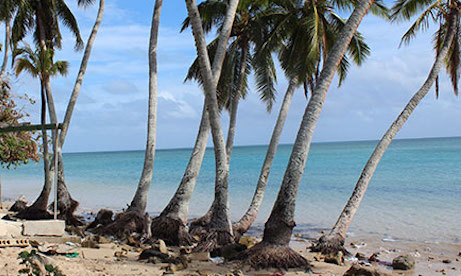Caritas Aotearoa New Zealand’s chief, Julianne Hickey has been in Rome recently and was in meetings preparing for Pope Francis’ new encyclical Laudato Si’.
She was able to give an input from the Pacific perspective where oceans are so important for the sustaining of life.
Hickey was able to speak of what is happening to the food sources like fishing and the instability of crops because of uncertain weather patterns.
She spoke about the effect of extreme weather events which often destroy livelihoods and homes.
Research done by Caritas Aotearoa New Zealand last year highlighted communities around the Pacific fending off rising sea-levels and coastal erosion with makeshift seawalls, built from sticks and stones, shells and coral; or relocating temporarily or permanently to escape sea inundation and groundwater salination.
Laudato Si’ highlights a number of issues which are of particular interest to small island nations.
Loss of marine biodiversity
- In tropical and subtropical seas, we find coral reefs comparable to the great forests on dry land, for they shelter approximately a million species, including fish, crabs, mollusks, sponges and algae. Many of the world’s coral reefs are already barren or in a state of constant decline. [41]
-
Sea level rise
A rise in the sea level…can create extremely serious situations, if we consider that a quarter of the world’s population lives on the coast or nearby, and that the majority of our megacities are situated in coastal areas. [24]
-
Ocean acidification
Carbon dioxide pollution increases the acidification of the oceans and compromises the marine food chain. If present trends continue, this century may well witness…an unprecedented destruction of ecosystems, with serious consequences for all of us. [24]
-
Ocean-bound water pollution
Underground water sources in many places are threatened by the pollution produced in certain mining, farming and industrial activities, especially in countries lacking adequate regulation or controls. It is not only a question of industrial waste. Detergents and chemical products, commonly used in many places of the world, continue to pour into our rivers, lakes and seas.”[29]
-
Overfishing and seafood bycatch
Marine life in rivers, lakes, seas and oceans, which feeds a great part of the world’s population, is affected by uncontrolled fishing, leading to a drastic depletion of certain species. Selective forms of fishing which discard much of what they collect continue unabated. Particularly threatened are marine organisms which we tend to overlook, like some forms of plankton; they represent a significant element in the ocean food chain, and species used for our food ultimately depend on them.”[40]
- Source
- radioaustralia.net.au
- thinkprogress.org
- caritas.org.nz
- Image: caritas.org.nz
